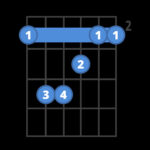Paul Simon, a name synonymous with songwriting genius, had hinted at retirement. After a farewell tour in 2018, it seemed the world might have heard the last of his new music. Yet, the creative spirit, particularly his deep connection with the Seven Guitar strings that have been his lifelong companion, was far from silent. In 2019, a dream sparked the concept for Seven Psalms, an album unlike anything he has created before. This isn’t just another Paul Simon record; it’s a profound exploration of faith, reflection, and the enduring power of the acoustic guitar.
Even within a discography brimming with iconic albums like Sounds of Silence, Bridge Over Troubled Water, Graceland, and Still Crazy After All These Years, Seven Psalms stands alone. This album, a 33-minute continuous piece divided into seven movements, is a deep dive into Simon’s artistry with his acoustic guitar. While his songwriting prowess has always been celebrated, Seven Psalms brings his guitar playing into sharper focus. This is a record where the seven guitar strings sing as eloquently as his vocals.
Acoustic guitar is the bedrock of Seven Psalms. Simon primarily uses a Gurian guitar, a long-time favorite, and the album beautifully captures its rich tones thanks to engineer and co-producer Kyle Crusham. The fingerstyle arrangements are intricate and melodic, so much so that they could easily exist as purely instrumental works. While past albums have showcased his guitar skills, Seven Psalms elevates his guitar playing to center stage, revealing a depth often overshadowed by his lyrical brilliance. For guitar players, this album is a masterclass in acoustic guitar expression, showcasing what can be achieved with just seven guitar strings and a lifetime of dedication.
The album’s opening movement, “The Lord,” introduces a recurring Am–G–D/F# guitar figure. This motif reappears throughout the album, anchoring the piece musically as the lyrics explore diverse metaphors. Simon sings, “The Lord is an engineer,” and later, “The Covid virus is the Lord” and “The Lord is the music I hear.” Drawing inspiration from the Old Testament Psalms, the album delves into themes of faith and doubt, presented through dreamlike lyrics that resist simple interpretations. The seven guitar movements weave together these lyrical and musical threads into a cohesive and thought-provoking whole.
Amidst the prevailing meditative atmosphere, Simon’s characteristic wit surfaces in “Professional Opinion.” This playful blues track features wry lyrics like, “Good morning, Mr. Indignation/ Looks like you haven’t slept all night,” delivered with harmonized vocals and sliding double-stops on the guitar neck. It’s a reminder that even within a deeply introspective work, there’s room for the lighter touches that define Simon’s unique style. Even in this playful moment, the seven guitar is at the heart of the music, driving the bluesy feel.
Enhancing the sonic landscape are subtle instrumental additions – gongs, bells, harmonium, frame drum, and bass harmonica, all played by Simon, alongside the Voces8 chorus and a chamber orchestra. His wife, Edie Brickell, adds intimate vocal harmonies on “The Sacred Harp” and “Wait,” creating moments of tender duet. These elements enrich the texture without overshadowing the central role of Simon’s voice and, crucially, his seven guitar.
In the final movement, Simon seems to address his hinted retirement. Over a spacious, descending guitar line, he sings:
Wait
I’m not ready
I’m just packing my gear
Wait
My hand’s steady
My mind is still clear
This poignant conclusion leaves listeners with a sense of gratitude. After six decades of musical innovation, Paul Simon remains a vital artist, still exploring, still surprising, and still captivating audiences with his unique voice and the timeless voice of his seven guitar. Seven Psalms is not just a testament to his enduring talent, but a profound statement on faith, reflection, and the unwavering power of music created with an acoustic guitar.

